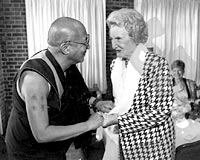Who was Wilma Dykeman? It’s more than a rhetorical question. For many, her name reaches only as far as the banks of the French Broad, the river she lived near all her life and illuminated in her first book, 1955’s The French Broad.

But Dykeman was more than one book, one genre, one discipline. She was one of those rare people in letters who successfully played hopscotch with her passions; along with her nonfiction works, she was a novelist, a freelance writer, an historian, a folklorist, an environmentalist, a teacher and lecturer, a civil-rights activist, a feminist, and an advocate for the often-misunderstood people of Southern Appalachia.
Name a category, and she seemed to not only fill it, but fill it with rare intelligence, wit and dignity.
Dykeman died last year at age 86, but the memorializing flows on unabated. On June 13, she’ll receive an all-star tribute at Asheville’s Diana Wortham Theatre. Hosting the free event will be Doug Orr, president emeritus of Warren Wilson College, where Dykeman delivered more than one commencement address. The service will feature a 20-minute video describing the contours of her life, narrated by the author herself and featuring the music of David Holt. The program will continue on through a series of reminiscences delivered by notable authors including Fred Chappell, John Ehle, Sharyn McCrumb, Robert Morgan and Lee Smith. High-country crooner Laura Boosinger will provide music.
Born in Asheville in 1920, Dykeman seemed wholly fashioned from the rock and soil of Southern Appalachia. She grew up an only child at the head of Lynn Cove, along Beaverdam Creek. Her father, a widower, had moved to Asheville from New York state after being swept up in the romance of the place.
Dykeman attended primary and secondary school at Grace Academy and started at Biltmore Junior College in Asheville before continuing on to Northwestern University in Chicago, where she earned a bachelor’s degree in speech.
“Her ambition was to become a stage actor,” says James Stokely III, one of Dykeman’s two sons, who today lives in Boston. But if the stage beckoned, love managed to intervene. While in New York in 1940, Dykeman went on a double date arranged by Thomas Wolfe’s sister, Mabel, and met James R. Stokely Jr. Within months, the two were married.
Dykeman did take the stage, though in a less grandiose fashion than she may have wished for—in community productions in Asheville. But even here she managed to cross paths with some notables, including Charlton Heston, who directed her in a number of productions.
If her original career path was stymied, Dykeman’s abilities found other outlets. In 1955, she saw The French Broad published as part of the Rivers of America series; in 1966, a novel, The Tall Woman, went to print, followed by its sequel, The Far Family.
Collaborations with her husband, who was also a writer, included Neither Black Nor White (1957), a personal take on integration in the South; Seeds of Southern Change (1976), which focused on race relations; and Prophet of Plenty (1966), a biography of Will W. Alexander, a Southern leader who worked for racial equality.
Her son explains that her concern for social justice came from the fact that “she was a true child of the Depression. She was born in 1920 to a family of modest means, and what earnings they had were lost when the banks failed in Asheville. So she had this sense of what life is like when you’re looking up at the ‘winners.’”
In 1976, Dykeman completed Tennessee: A Bicentennial History. She also worked with her two sons on two books.
Dykeman’s poise on the dais earned her a great number of public-speaking engagements. (There is a picture of her shaking hands with the Dalai Lama at one event, Dykeman in a natty houndstooth blazer and scarf, and His Holiness in the expected rust-colored robes.) Literary honors arrived at her doorstep in the form of a Guggenheim Fellowship and the 1985 North Carolina Award for Literature. Dykeman lectured at the University of Tennessee and held the honorary title of that state’s historian from 1981 until she died.
The video scheduled to be screened at Wednesday’s remembrance will include rare 16mm-footage of Dykeman’s life, including scenes from her marriage to Stokely (who died in 1977) and her moments on the stage.
“I would put her in the ‘renaissance’ tradition,” says her son. “She had such a broad spectrum of talents, such an impressive series of artistic paths. She turned out to be good at everything she tried. And she turned out to be very good at a few things.”
Wilma Dykeman, A Celebration will be held at 4 p.m. at Diana Wortham Theatre on Wednesday, June 13. Free. 257-4530.



Before you comment
The comments section is here to provide a platform for civil dialogue on the issues we face together as a local community. Xpress is committed to offering this platform for all voices, but when the tone of the discussion gets nasty or strays off topic, we believe many people choose not to participate. Xpress editors are determined to moderate comments to ensure a constructive interchange is maintained. All comments judged not to be in keeping with the spirit of civil discourse will be removed and repeat violators will be banned. See here for our terms of service. Thank you for being part of this effort to promote respectful discussion.